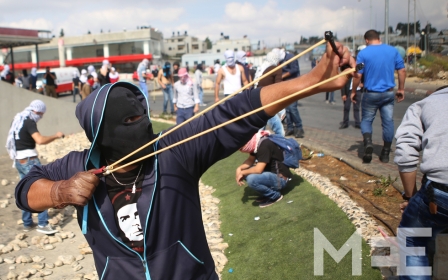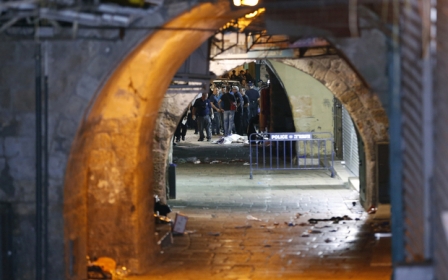Settlers say violent escalations further their resolve for self-defence

TEL AVIV - On the front door of the Henken family home in the West Bank settlement of Nerya, colourful signs in children’s handwriting express condolences for the father and mother of the house. Eitam and Naama were ambushed in their car and fatally shot at point-blank range on 1 October. In a message to Henken’s four children, who were in the back seat and witnessed the attack, the signs wished them a quick return to their home in this contested territory.
The shooting of the Henken couple has set off the latest round of tit-for-tat confrontations. Two days later in Jerusalem’s Old City, a Palestinian assailant stabbed an Israeli family returning from Saturday evening prayer, killing the father, Aharon Banita, as well as the rabbi, Nehemia Lavie, who police reported had heard the commotion and came down from his apartment to try to help.
Fierce clashes and high tensions have spread throughout both Israel and in the Palestinian territories, resulting in the deaths of 13 Palestinians, including a number of teenagers seen attacking Israelis, as well as those involved in, or caught in the crossfire of, clashes against Israeli security forces. Since Thursday, Palestinian media reported that nine Gazans were shot dead by Israeli soldiers during demonstrations. On Sunday morning, a Palestinian woman detonated a bomb at a checkpoint between Jerusalem and a nearby settlement.
Yet as the settlements, as well as Temple Mount, became the subject of increasing contention, the atmosphere in the West Bank remained relatively calm, with many asserting that this “wave of terror,” like others before it, would soon pass, residents said.
Yagil Henken, the brother of the deceased Eitam Henken, said that recent developments - “not the worse we’ve seen” - should be understood only as the continuation of a long-simmering religious-national conflict, fuelled by the “Arab’s” inability to accept the Jews’ return to their “ancient homeland”.
“It didn’t start today, and not with the founding of the state of Israel,” said Henkin, a military historian at the IDF staff commanding college.
He said that he blames the tragic murder of his brother and sister-in-law on a “Palestinian society that thinks that such terror attacks are a legitimate way of actions, that applauds the terrorists, and who are actually funded by foreign countries who pay very generous salaries to the families of terrorists in jail,” he said.
He said that the death of the Henken couple, and of the Israelis killed thereafter, only further reinforces the urgency of the Israeli settlement enterprise in the West Bank, which he says is a Jewish birthright. He said that the residents there were “safe,” though residents called upon the government for additional military presence.
More settlements equal more attacks
Under the government of Benjamin Netanyahu between 2009 and 2014, settlement expansion has skyrocketed to constitute more than twice the amount of buildings in comparison to Israel proper, according to Israel’s Central Bureau of Statistics. According to several human rights activists, that building surge has in turn emboldened settler communities in every way, including the fringe that aim to attack Palestinians in an attempt to intimidate them from the land.
A 2013 UN report affirmed links of settlement growth with an accompanying surge of settler violence, which has since 2005 most notoriously manifested as the “Tag Mehir,” or “price tag” movement – a term used to describe its threat that whenever the Israeli government moved to curb settlement expansion, it would exact a “price” in the form of attacking Palestinian persons or property.
The UN report said that in addition to attacks on agricultural lands and properties, 14 attacks on schools by Israeli settlers were reported in the years between 2009 and 2013, and that the Israeli security forces’ failure to protect Palestinians from such acts “raises questions about [its] willingness to undertake law enforcement in a non-discriminatory manner”.
Udi Levy, the head of the task force created to combat settler violence, said that attacks have in the past year moved away from smaller scale attacks like vandalism and the uprooting of olive orchards, and have instead tended towards physical attacks against Palestinians with the intent of causing harm.
“While we have been able to gather quality intelligence and achieve deterrence, the young activists that we are dealing with have begun to take a harder line and begun carrying out acts intended to shock and disturb the order in this country,” said Levy.
That “shock” came on 30 July, when suspected masked settlers snuck into the West Bank village of Duma in the dead of night, hurled firebombs into the homes of two families, and scrawled “Long Live the Messiah” and “Revenge!” in black graffiti on a nearby wall. An 18-month-old baby, Ali Saad Dawabsheh, was immediately burned to death in the fire, and shortly thereafter, his parents, Saad and Reham, also succumbed to severe burn wounds sustained in the attack. Duma resident Zohdei Dawabsheh said that while Duma had always been a “village of peace”, he and his neighbors would now not hesitate to “kill any Israeli who came into the village”.
While Netanyahu called the arson a “horrific, heinous act of Jewish terror,” and vowed to implement a crackdown in order to locate and apprehend the perpetrators, three months later the security forces - known for successfully tracking down Palestinians accused of carrying out terror with controversial methods like home raids or heavy troop deployments - have reported no progress.
According to the NGO Yesh Din, which tracks settlement activities, a pattern has emerged. It has found that more than 85 percent of settler violence cases opened in the West Bank were closed "due to the [authorities'] failure to investigate properly”. Between 2005 and 2014, moreover, it said that only 7 percent of investigation files of settler violence cases led to indictments.
In attacking Palestinians and scrawling their messianic graffiti, this youth movement from across Israel and the West Bank can be understood as a new, younger, more anti-hierarchical form of “romantic religious Zionism”, said Shlomo Fischer, a sociology professor and expert on Jewish extremism, who said that many young people’s desire to return Israel to a “purer” state is comparable to the region’s other extremist groups such as the so-called Islamic State.
Unabated violence
In past weeks, violent activities have continued unabated, both in isolated and mainstream Israeli communities.
One hundred and thirty-three incidents of settler violence have been reported in the West Bank, according to Ghassan Daghlas, a Palestinian official who monitors settler activity in the territory. A recent incident includes masked men from the settlement of Yitzhar throwing stones toward Palestinians, with the accompaniment of Israeli soldiers, as was caught on video and uploaded to the website of the NGO Btselem.
On Friday, a 17-year-old Israeli who later told police, “All Arabs are terrorists,” stabbed and wounded four Palestinians in the southern city of Dimona. Social media flared up with accusations that unlike the Palestinian attackers, with whom Israeli police immediately responded with violence, the Israeli assailant was not injured but instead taken in for a psychiatric evaluation.
For their part, settlers and their leaders have condemned the Jewish terror attacks, but also aimed to redirect the conversation to “Arab terror”, which they say is the crux of the problem.
Avi Roeh, chairman of the Binyamin Regional Council in the West Bank characterised Tag Mehir and other Israeli attacks on Palestinians as “inhuman and un-Jewish”. But he also denied the connection between such attacks and the current violence, adding that, in any case, his and other settlements’ “authority does not extend outside of the Jewish communities - that is the job of the IDF and the police”.
Call to seize West Bank
He said that now, more urgently than ever before, it falls upon Israel to take advantage of “this historic moment,” and act to “annex the West Bank, both its land and people,” he told Middle East Eye, in front of the prime minister's residence in Jerusalem, where kindergarten children from various West Bank settlements gathered to protest the lack of security in their communities.
But the Israeli government’s announcements of increased security measures, such as outlawing the northern branch of the Islamic Movement or installing cameras along West Bank roads, do not indicate a long-term strategy, other than cautiously maintaining the status quo.
At a press conference last week, Netanyahu offered “no goal, no vision of how he wants our relation with Palestinians to look at the end of his term,” wrote Barak Ravid in the Israeli daily Haaretz.
“He is trying as much as possible to avoid any further escalation that could be caused by a wide-ranging military operation in the West Bank or a diplomatic escalation by expanding settlements.”
But for many of the 500,000 Israelis in the West Bank, questions of scaling back their presence in the West Bank, or any questions of peace at all, are irrelevant, residents said.
“The real question is, how do we continue to fight the savage [Palestinian] enemy?” said Nir Salomon, spokesperson of the settlement of Nerya.
“I can understand when a 16-year-old boy says, ‘My neighbors were murdered in cold blood, I can’t sit quietly.’ We have to tell them that it’s inappropriate to take out that rage,” he said, while clarifying that the real responsibility lies with the state to ensure that Palestinian attacks “never happen again”.
Much like the arguments heard among those who settled the Gaza Strip before the 2005 Israeli disengagement, moreover, Salomon said that his community serves as a buffer between the “Arabs” and central Israel, and therein prevents “Iran from shooting missiles” directly into the Israeli heartland.
From a mountaintop overlooking Israeli vineyards and a line of Palestinian villages, Salomon mentioned that while the “Arabs” have no direct connection to 90 percent of the land, “we [the settlers] are all for coexistence, but only if they come in peace, as we come in peace.”
New MEE newsletter: Jerusalem Dispatch
Sign up to get the latest insights and analysis on Israel-Palestine, alongside Turkey Unpacked and other MEE newsletters
Middle East Eye delivers independent and unrivalled coverage and analysis of the Middle East, North Africa and beyond. To learn more about republishing this content and the associated fees, please fill out this form. More about MEE can be found here.



